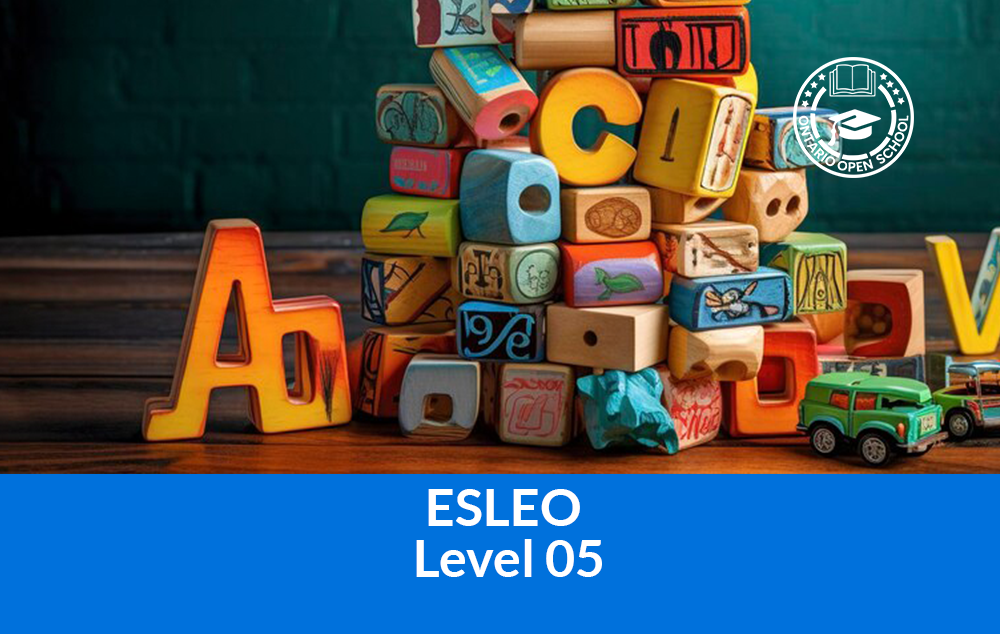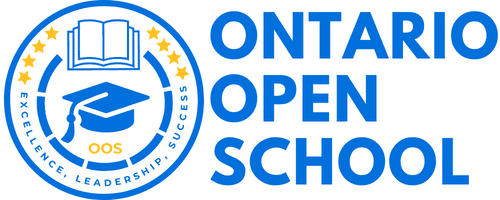- info@ontarioopenschool.com
- 647-494-4499
-
Unit 100 - 29 Gervais Drive, North York, ON.
M3C 1Y9
Copyright 2024 Ontario Open School Inc. All Rights Reserved.
This course further extends students’ skills in listening, speaking, reading, and writing in English for a variety of everyday and academic purposes. Students will make short classroom oral presentations; read a variety of adapted and original texts in English; and write using a variety of text forms. As well, students will expand their academic vocabulary and their study skills to facilitate their transition to the mainstream school program. This course also introduces students to the rights and responsibilities inherent in Canadian citizenship, and to a variety of current Canadian issues.
Unit Order | Unit Name | Suggested Time |
|---|---|---|
| Unit 1-2 | Reading and Writing In terms of reading, students will engage in a variety of reading activities focusing on determining meaning, responding to, and evaluating texts. In particular, they will examine the elements of some text forms such as short stories and reports. They will develop reading comprehension and vocabulary building strategies. In addition, students will develop research skills and practice critical thinking. Students will also develop the writing skills appropriate for this level. More specifically, they will develop accuracy in their writing in focusing on grammatical structures, conventions of Standard English, and spelling strategies. Every class will have a writing conventions component. In addition, students will engage in the writing process as they organize their ideas to write for different purposes. | 34 hours |
| Unit 3 | Speaking Students will develop fluency and accuracy in speaking by practicing the pronunciation of various sounds, and by engaging in discussion on a regular basis, using conversational strategies and presenting ideas to the class. | 24 hours |
| Unit 4 | Socio-Cultural Competence Students will learn how to use English in socially and culturally appropriate ways through the study of the Canadian way. In particular, students will examine some aspects of Canada’s history and its relationship with the United States of America. Moreover, students will demonstrate knowledge of a variety of key facts about Canadian citizenship, social programs, and levels of government. They will also compare and contrast the traditions and behavioral norms of a number of cultural communities in Canada. In addition, students will learn how to adapt to school life in Ontario by developing knowledge of the school system and resources available to support learning. They will develop study skills and appropriate strategies for participating in cooperative learning so that they can successfully achieve their academic goals and accomplish group tasks. | 22 hours |
| Unit 5 | Media Literacy
| 22 hours |
| Final Evaluation 30% | Culminating Assignment Final Exam | 6 hours 2 hours |
| Total | 110 Hours |
A variety of strategies are used to allow students many opportunities to attain the necessary skills for success in this course. The teacher uses a variety of whole class, small group and individual activities to facilitate learning. The following is a list of specific teaching/learning strategies that the teacher may use but is not limited to:
|
Course Specific |
Language |
Collaborative |
|
Direct teaching Teaching notes Work and tasks sheets Homework Independent reading Independent study Problem solving Information Analysis Research Portfolio Reflection Presentation Decision making Group Assignments Brainstorming Diagrams Problem-based learning Peer-evaluation Self-evaluation |
Oral presentation Class Discussion Small group discussion Teacher-student conferencing Peer-evaluation Personal response notes Reading and answering questions Socratic Dialogue |
Cooperative learning Peer-evaluation Brainstorming Group discussion Student-teacher conferencing |
Purpose
The primary purpose of assessment is to improve student learning. Assessment relates directly to the expectations for the course.
A variety of assessments for and as learning are conducted on a regular basis to allow ample opportunities for students to improve and ultimately demonstrate their full range of learning and for the teacher to gather information to provide feedback. Assessment tasks relate to the success criteria set out in lesson plans. Success criteria allow students to see what quality looks like.
Evaluation is the process of judging the quality of student work in relation to the achievement chart categories and criteria and assigning a percentage grade to represent that quality. Evaluation is based on gathering evidence of student achievement through:
Assessment for Learning – we provide feedback and coaching. Assessment FOR Learning is the process of seeking and interpreting evidence for the use of learners and their teachers to decide where the learners are in their learning, where they need to go, and how best to go there.
Assessment as Learning – we help students monitor progress, set goals, reflect on their learning
Assessment AS Learning is the process of the explicit fostering of students’ capacity over time to be their own best assessors, but teachers need to start by presenting and modeling external, structured opportunities for students to assess themselves.
Assessment of Learning – we use assessments to provide evaluative statements about student achievement. Assessment OF Learning is the assessment that becomes public and results in statements of symbols
(marks/grades/levels of achievement) about how well students are learning. It often contributes to pivotal decisions that will affect students’ future.
ASSESSMENT TOOLS
| Assessment as Learning | Assessment for Learning | Assessment of Learning |
|
Student Product Journals/Letters/Emails (checklist) Learning Logs (anecdotal)
|
Student Product
Assignment Journals/Letters/Emails (checklist) Pre-tests (scale/rubric) Quizzes (scale/rubric) Rough drafts (rubric) Portfolios (rubric) Peer feedback (anecdotal/checklist) Reports (rubric) Vocabulary notebooks (anecdotal) |
Student Product Assignment Tests (scale/rubric) Exam Rough drafts (rubric) Portfolio (rubric) Essays (rubric)
|
|
Observation Whole class discussions (anecdotal) Self-proofreading (checklist)
|
Observation
Class discussions (anecdotal) Performance tasks (anecdotal/scale) |
Observation Presentation (rubric) Performance tasks (anecdotal/scale) |
|
Conversation Student teacher conferences (checklist) Small Group Discussions (checklist) Pair work (checklist) Debate (rubric)
|
Conversation
Student teacher conferences (checklist) Small group discussions (checklist) Pair work (anecdotal) Peer-feedback (anecdotal) Oral quizzes (scale/rubric) |
Conversation Student teacher conferences (checklist) Oral tests (scale/rubric)
|
Resources
Understanding and Using English Grammar, B. Azar
Sightlines 10, Mary Crane, Barbara Fullerton et al
A manual dictionary of your choice and/or refer to the following link to look up words: http://www.oxfordadvancedlearnersdictionary.com/?cc=tr
Growing Success: Assessment Evaluation and Reporting in Ontario Schools, First Edition Covering Grades 1-12
Grading
Weighting of categories
| Knowledge/Understanding | Thinking/Inquiry | Communication | Application |
| 25% | 25% | 25% | 25% |

Course Grade | ESL |
|---|---|
Course Code | ESLEO |
Course Category | English As a Second Language (ESL) |
Course Type | Open |
Course Delivery | Online |
Course Duration | 8hrs |
Course Credit | 0 |
Copyright 2024 Ontario Open School Inc. All Rights Reserved.
